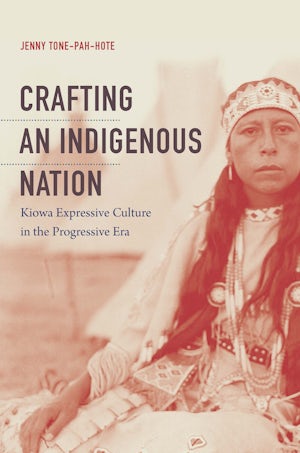Crafting an Indigenous Nation
Kiowa Expressive Culture in the Progressive Era
By Jenny Tone-Pah-Hote
162 pp., 6.125 x 9.25, 15 halftones, notes, bibl., index
-
Paperback ISBN: 978-1-4696-4366-3
Published: February 2019 -
Hardcover ISBN: 978-1-4696-4365-6
Published: February 2019 -
E-book EPUB ISBN: 978-1-4696-4367-0
Published: January 2019 -
E-book PDF ISBN: 979-8-8908-5138-3
Published: January 2019
Buy this Book
- Paperback $32.50
- Hardcover $99.00
- E-Book $22.99
For Professors:
Free E-Exam Copies
Awards & distinctions
Finalist, 2020 Lora Romero First Book Publication Prize, American Studies Association
Combatting a tendency to view Indigenous cultural production primarily in terms of resistance to settler-colonialism, Tone-Pah-Hote expands existing work on Kiowa culture by focusing on acts of creation and material objects that mattered as much for the nation's internal and familial relationships as for relations with those outside the tribe. In the end, she finds that during a time of political struggle and cultural dislocation at the turn of the twentieth century, the community's performative and expressive acts had much to do with the persistence, survival, and adaptation of the Kiowa nation.
About the Author
Jenny Tone-Pah-Hote (Kiowa) is assistant professor of American studies at the University of North Carolina at Chapel Hill.
For more information about Jenny Tone-Pah-Hote, visit
the
Author
Page.
Reviews
“Valuable for scholars seeking to understand how external pressures have shaped and altered Indigenous religions. . . . [Tone-Pah-Hote] demonstrate[s] in excellent detail the ways in which Kiowa communities have drawn on sacred power and ceremony to strengthen their self-determination.”—Nova Religio
"This book reminds us of the importance of understanding Native Americans as distinctly modern people who survived assimilation's assaults by aggressively navigating their way through this era." —Clyde Ellis, Elon University
"Drawing from a rich array of source material and blending personal experience with analytical skill, Jenny Tone-Pah-Hote explores carefully how, from the 1870s to the 1930s, the Kiowa created an expressive culture in pursuit of many important goals. In the face of powerful forces of assimilation and appropriation—vividly captured in this compact book—Kiowa people purposely mobilized dress, adornment, artwork, and dance to maintain bonds of kinship and community, represent change in religious identity, create new intertribal spaces, contribute to markets, preserve ties to territory, and exercise sovereignty." —Daniel H. Usner, Vanderbilt University




